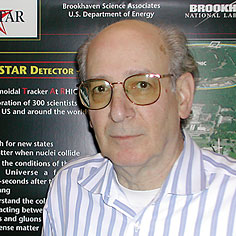
Obituary: Morton Kaplan
By Jocelyn Duffy
Morton Kaplan, emeritus professor of chemistry at Carnegie Mellon University, died September 19. He was 79. A member of the Carnegie Mellon faculty for 37 years, Kaplan had a prolific scientific career, where he studied a wide range of topics from the chemical aspects of Mössbauer spectroscopy and hyperfine interactions to the primordial chemistry of the early universe.
Kaplan was born November 21, 1933, in Chicago. He graduated high school at the age of 15, and enrolled at the University of Chicago's through a special program that allowed talented teenagers to earn a bachelor's degree. He then earned a master's degree from the University of Chicago 1956 and completed his doctoral degree in physical chemistry from MIT in 1960.
Kaplan joined the Carnegie Mellon faculty in 1970, after previously holding a faculty position at Yale University, where he was the recipient of an Alfred P. Sloan Foundation Research Fellowship, and research positions at the University of California, Berkeley's Lawrence Radiation Lab, and Massachusetts Institute of Technology (MIT).
On his arrival at Carnegie Mellon, he set up a laboratory where he used nuclear phenomena as a chemical probe to study hyperfine interactions. He taught a variety of undergraduate and graduate level classes in chemistry and mentored a number of students, including doctoral and postdoctoral students from around the world.
Spurred by the startup of numerous particle accelerators in the late 70s and early 80s, Kaplan expanded his research into studying the chemistry of particles created by the collision of heavy-ions. To help with the analysis of data from these colliders, Kaplan, along with Nobel Laureate John Pople and Emeritus Professor Bob Stewart, procured one of the earliest supercomputers for the university.
Most notably, Kaplan was one of the founding members of the Solenoidal Tracker at the RHIC (STAR) collaboration. He would later become the deputy director and only chemist on the executive committee of the collaboration. Based at the Brookhaven National Laboratory, STAR is one of four experiments at the Relativistic Heavy Ion Collider (RHIC). Kaplan and his more than 400 collaborators from around the world used the collider to attempt to identify and characterize the quark-gluon plasma, a transient state of matter thought to exist in the microsecond after the Big Bang.
Kaplan was well regarded among the scientific community. His work was continuously funded by the U.S. Department of Energy for 43 years. He was a member of the American Chemical Society, the American Physical Society and American Association for the Advancement of Science.
Kaplan is survived by his wife, Sandra (Solon), a son David, a daughter Susan, and granddaughters Natalie and Abigail.
Funeral services will be held at 1:30 p.m., Sunday, Sept. 22 in the new sanctuary of Temple Emanuel in Mount Lebanon, Pa. In lieu of flowers, donations may be made to the Anti-Defamation League via their web site, http://www.adl.org/donate/.
Originally published: https://www.cmu.edu/mcs/news-events/2013/0920-Obituary-Kaplan.html